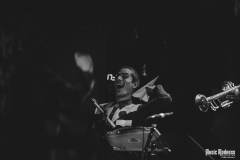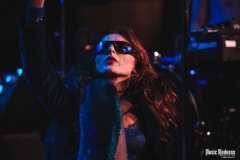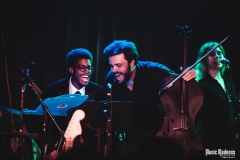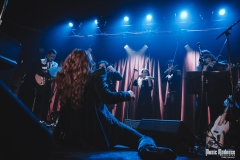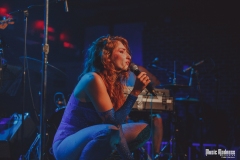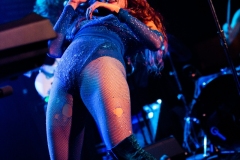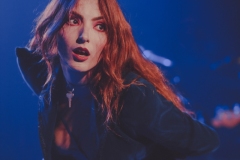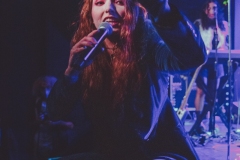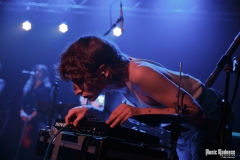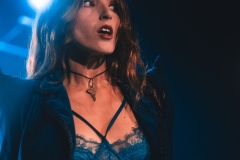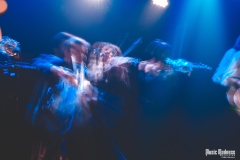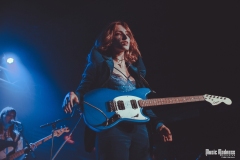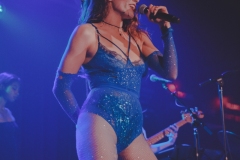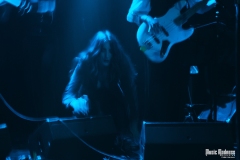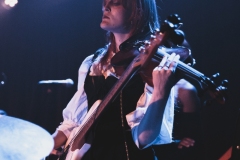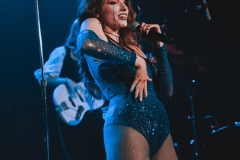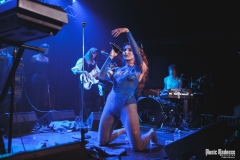
When Haley Dahl decided to record her second album as Sloppy Jane in a cave system in West Virginia, it was destined to come out profoundly strange. It’s the kind of mad-genius album-making lore that doesn’t pop up in this millennium as much as it did in the past, at least not as something more than a gimmick. But Sloppy Jane clearly put every ounce of themselves into the effort, and the resulting record, Madison, is easily one of the most singular pieces of work in recent memory: unclassifiable, meticulously orchestrated, deeply weird. And as if the recorded version were not enough to throw a listener for a loop, the experience of Madison and Sloppy Jane as a whole becomes even more captivating live.
Dahl wears the same cerulean bodysuit each night underneath a suit of similar hue, that color defining this entire era of the band as they made the move to once-bandmate Phoebe Bridgers’ Saddest Factory records. Awash in strings and pageantry, Madison is no product of temporary affectation, but rather the culmination of a desire that’s been simmering in Dahl and her band for some time. Looking back to Sloppy Jane’s earlier releases, Willow and Sure-Tuff, buried in the distorted psych- and surf-rock-influenced noise are the seeds of what would develop into the world of Madison, starting with her cover of Napoleon XIV’s unlikely 60s radio hit ‘They’re Coming to Take Me Away Ha-Ha!’ that pointed at Dahl’s theatrical ambitions. ‘In the Future It Was Me That Burned It Down’ too foreshadowed the glockenspiel-backed choral narration that marks Madison, like a bespoke and twisted folktale, murder ballads rendered with the instruments of children’s music.
Dahl has spared no expense translating Madison to live performances, traveling with a string quartet and a trumpet player, as well as delegating flute, glockenspiel, bells, and synths to those providing the more traditional rock-band instrumentation. They perform the record in its entirety over the course of the evening, punctuated in the midsection by a pair of tracks from Willow that whiplash the set in a different direction. But the night begins as Madison does, with the tremulous strings of its ‘Overture’ that grow ever wilder, until Dahl takes the stage and starts conducting the band, one of many times she does so throughout the evening.
They stop the cacophony at a millisecond’s notice from her, and she even conducts as she kneels on the floor. She finally reverses and faces the crowd for ‘Party Anthem’ – her “were you better as a phantom symphony, or party anthem?” is akin to a gorgeously-rendered update of “a walk-on part in the war, or a lead role in a cage,” and the song contains a piece of the fragmented narrative that lurks throughout the album. ‘Jesus and Your Living Room Floor’ is something of a will from Dahl’s narrator, directed at the subject of a seemingly-unreciprocated affection, and referencing the blue plastic horse she holds aloft on the album’s cover. Like the caves in which the album gestated, only some of the detail here is illuminated in lyricism, and a wealth remains in shadow.
‘Judy’s Bedroom’ is one of those aforementioned death songs as well, turning true crime into a nursery rhyme-worthy singalong, and the audience chimes in with the requisite sitcom sound effects (“Aww!”), adding to its uncomfortable juxtaposition alongside the upturned harmonizing of the onomatopoetic chorus. (I’ll give you one guess as to the color of the titular bedroom.) And while an interlude traditionally heralds a lull, Sloppy Jane flips that notion on its head with two of the most captivating selections from Willow, starting with ‘Bark Like a God’ which finds Dahl running offstage momentarily, returning on all fours with artificial blue tears trickling down her face. She removes her long boots and sheds both her suit jacket and trousers til she’s in nothing more than that ubiquitous blue jumpsuit, slinking across the stage to a menacing brand of blues that recalls Real Gone-era Tom Waits. Waits’ unrestricted exploration of his unique vocals and bizarre sounds seems to have inspired Dahl throughout her career, ‘Aunt Rosie’s Garden’ from Sure-Tuff just one prime example.
Things come to a head with ‘Where’s My Wife’, those three words repeated in all sorts of varying intonations as Dahl goes climbing out onto the railing, leaning over into the crowd. Then herded back into the cave by another instrumental, ‘Lullaby Formica’ is Dahl counting down to a foregone conclusion of solitude, spinning as if on a carousel, and finally holding an empty hand out as if it contained her final plastic horse and passing it along to the audience. The title track’s long outro sees yet another instrument – chimes – being “played” by multi-instrumentalist Nathan Lopez, mounted in the frills of a white country jacket. Later on Lopez and keyboardist/flutist Lily Rothman attempt to fold some paper planes and toss them to the audience during a quieter passage, though these are thwarted by the airflow in the venue until Lopez finally produces one aerodynamic enough to go sailing into the front row in time for the intro of ‘Wonderama’. It’s here Dahl introduces the band, but only after they freeze perfectly still, even as each one is applauded, just as they stopped with such precision earlier on.
In advance of ‘The Constable’, the longest single piece on Madison, Dahl gives out some thoughts on the idea of New Year’s Eve: “Life is really hard, and it’s very merciful that they give us a holiday to start over.” The song – and every Sloppy Jane performance, by extension – contains a countdown, a chance to start over. “Goodbye forever… I will see you again tomorrow,” goes the central refrain; Dahl, Lopez, and bassist Isabella Bustanoby are high-kicking ersatz the Rockettes, the latter two still playing their instruments. (Bustanoby previously was seen playing bass and viola at the same time, almost inexplicably.) Just before the countdown, there’s little more than Dahl’s voice and Rothman’s piano: “I couldn’t hear a sound / well they say love is loud.” – a cavernous solitude that ensures the band brings the scale of the Lost World Caverns wherever it might go. On the album’s cover, Dahl is facing away from the camera, backlit, holding that plastic horse high enough to cast a shadow on the wall. When she sings, “you were half-pretend / it never happened” one can’t help but think of the classic allegory of shadows cast on a cave wall, all forming a substitute reality: one that “never happened… never ends”.
Review and photos by Collin Heroux

